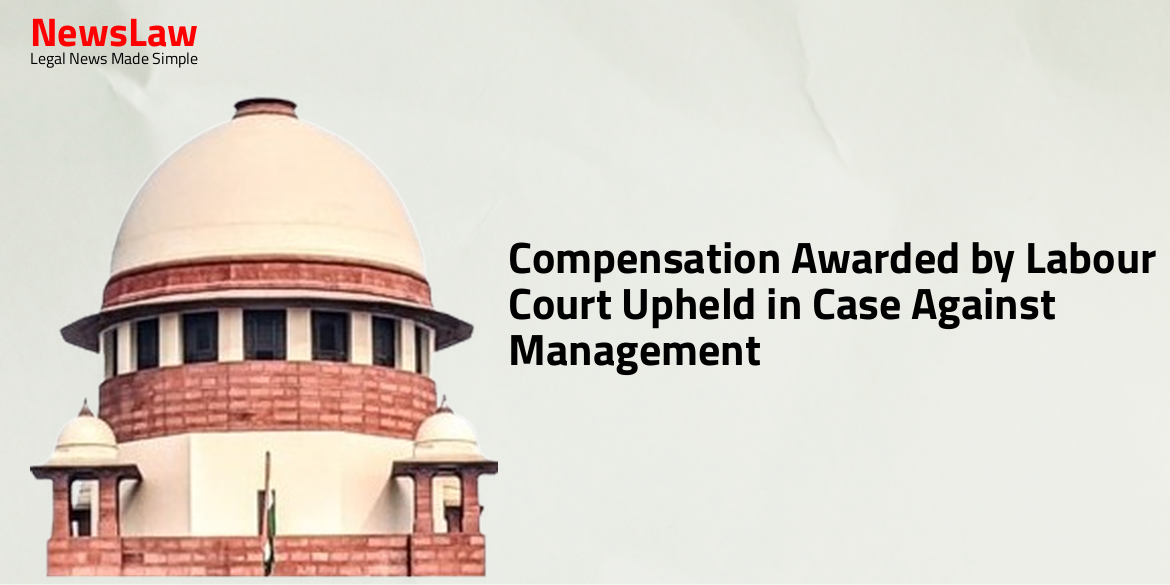In a recent ruling by the Delhi High Court, the compensation awarded by the Labour Court in the case involving the workman and the management has been upheld. The decision supports the workman’s entitlement to compensation as per the correct designation and payment calculations. The Court’s judgment ensures fair treatment in the dispute between the parties.
Facts
- The Labour Court failed to recognize that the workman had always received a salary appropriate for an unskilled worker and never objected during his employment.
- The judgement of the Industrial Tribunal did not designate the workman as skilled according to the scheduled employment rates for plastic, rubber, and PVC industries.
- The workman’s salary was consistent with that of an unskilled worker as per the prescribed rates.
- The Labour Court erroneously referenced unrelated court cases in its decision.
- The lack of urgency from either party in addressing the impugned award and the pending Stay Application indicate no pressing need for a stay.
- The Labour Court failed to consider the consequences if the designation matter in the High Court reversed the Industrial Tribunal’s award.
- The workman’s designation as a ‘packer’ was classified as an unskilled role as per the industry’s wage rates.
- The retrenchment compensation provided was deemed inadequate by the Labour Court.
- The workman was deemed entitled to wages of skilled/semi-skilled category which were not paid by the management.
- The compensation awarded was a lump-sum of Rs.200,000 with 9% interest per annum if not paid within a month.
- The workman’s entitlement to back wages is pending decision by the High Court.
- The management failed to consider the designations and wages of skilled and semi-skilled workers as granted by POIT.
- The period from date of transfer till rejoining should not be included in the total working period for calculating retrenchment compensation.
- Sections 9A and 25-N of the Act were deemed not applicable to the case.
Issue
- The issue before the Court is whether the stayed award of the Industrial Tribunal could be relied upon by the Labour Court to determine entitlement to compensation.
- The workman in question was receiving the salary of an ‘unskilled’ laborer from the date of appointment until the time of retrenchment.
- The Court framed two specific issues for consideration: 1) Whether the termination of the workman’s services and the subsequent retrenchment violated Section 25F of the Act, and 2) Whether the stayed award of the Industrial Tribunal could be used to establish entitlement to compensation.
- The crux of the matter is whether the Labour Court’s award warrants intervention under Article 226 of the Constitution of India.
Arguments
- The petitioner argues that the award dated 29 September, 2009, which was in operation at the time of the illegal retrenchment of the workman on 5 May, 2010, was wrongly relied upon by the Labour Court.
- The petitioner contests the application of judgments from unrelated cases by the Labour Court, asserting that the facts of those cases differ significantly from the present matter.
- The petitioner highlights that the workman was willing to work but was kept away without justification, and emphasizes that the stay imposed in November 2013 on a related writ petition should have prevented the passing of the impugned award.
- The petitioner points out that the workman had not raised any issues regarding his designation or pay as an unskilled worker during his long period of service before his retrenchment in 2010.
- Regarding the compensation calculations, the petitioner argues that there was no mala fide intention to underpay the workman, and challenges the Labour Court’s decision on these grounds.
- The petitioner also contends that the impugned award was passed in accordance with legal principles and due process and should not be set aside based on lack of illegality or perversity.
- Lastly, the petitioner asserts that the workman’s involvement in union activities and grievance redressal should not be the basis for the impugned award, and calls for proper calculation and settlement of any outstanding dues in case of a resolution in the related designation matter.
- The Respondent argued that granting designation to the claimant has been stayed due to correct calculation of retrenchment compensation and notice pay based on last drawn wages, not as per the unchallenged award of 29.09.2009.
- The unchallenged award is considered final and operating as res-judicata as it was not contested before any forum.
- The claimant had filed a case against his transfer, where it was held that he was engaged in an unskilled job.
Analysis
- The Labour Court rightly awarded compensation as per the designation of the workmen.
- The seniority list was displayed and sent to the Labour Department.
- The length of service of the claimant was 8 years.
- The case was decided in favor of the workers in 2009.
- No witnesses were examined regarding outsourcing allegations.
- Section 25-N of the Act was found not applicable.
- 22 workers filed a designation case in 2000, which was decided in their favor in 2009.
- Observation of POIT in the transfer case did not act as res judicata.
- Management provided attendance records and seniority list.
- Issues framed in 2011 regarding the illegal retrenchment of workers.
- The workmen failed to prove they were not surplus at the time of retrenchment.
- POIT held the transfers of workers to be illegal.
- The designation matter was stayed by the High Court in 2013.
- Workers were found entitled to designations in skilled and semi-skilled categories.
- Labour Court’s decision favored the workman in the violation of Section 25F of the Act.
- Management failed to calculate compensation as per the 2009 award.
- Provisions of Section 25-N did not apply due to insufficient workmen employed by the establishment.
- Retrenched worker claimed to not be surplus, but evidence supported otherwise.
- Witnesses had conflicting versions, but the Court ruled in favor of the workman.
- The Court’s decision was based on detailed scrutiny of evidence.
- Seniority list and attendance records played crucial roles in the case.
- The unskilled worker was held as skilled/semi-skilled by the Industrial Tribunal.
- Compensation was inadequate as it was not calculated based on the correct designation.
- The stay on designation matter did not affect the illegal retrenchment of the worker.
- The petitioner’s arguments against the award were rejected.
- The Labour Court did not exceed its jurisdiction nor act illegally.
- Witnesses’ lack of knowledge about the factory post-retrenchment was noted.
- The Court upheld the compensation decision based on the worker’s entitlement.
- Management failed to provide compensation in accordance with the designated skilled category.
- The entire material on record and factual scenario were duly considered by the Court.
- The Company violated Section 9A of the I.D. Act, resulting in illegal retrenchment.
- The attendance register contradicted the claim of insufficient employees for Section 25-N to apply.
- No outsourcing of work was established by the management.
- Stipulations for retrenchment compensation under Section 25-F were not met.
- The Industrial Tribunal’s decision in the worker’s favor was key in the Court’s award.
- The Court discussed the effect of stay on adjudication in the case Shree Chamundi Mopeds Ltd. v. Church of South India Trust Assn.
- The distinction between quashing and suspension of a law was highlighted, emphasizing that suspension holds the law in abeyance but does not remove it entirely.
- The duty of the Court is to restore parties to their position prior to the imposition of the stay when the substantive proceedings are dismissed or disposed of.
- The principles of restitution dictate that the successful party at the final stage is entitled to compensation for any losses incurred during the interim stage.
- Various judgments were cited to illustrate the application of restitution principles in cases of stays and dismissals of proceedings, emphasizing the importance of restoring parties to their original positions.
- Section 25-F of the Act requires specific conditions to be met for the retrenchment of a workman.
- Employer must give one month’s notice or pay wages in lieu of notice.
- Employee is entitled to compensation equivalent to fifteen days average pay for every completed year of continuous service at the time of retrenchment.
- Employee must have been in continuous service for at least one year to be eligible for compensation under this section.
- The Labour Court found that the petitioner management illegally retrenched the workmen without proper compensation based on their designations.
- The petitioner management failed to provide any arguments in their favor to support their case.
- The Court concluded that there is no merit in the petitions and affirmed the findings of the Labour Court as legal.
Decision
- The management is directed to pay the compensation as awarded by the Labour Court to the respective workmen within three months.
- The petitions are dismissed.
- The management must pay Rs.2,00,000/- to the workman within one month of the award publication, with interest at 9% per annum if delayed.
- Parties will bear their own costs.
- Award is passed accordingly.
- Copies of the award to be sent to the Govt. of NCT of Delhi for publication.
- File to be archived in the record room.
Case Title: SAWHNEY RUBBER INDUSTRIES Vs. PRATAP SINGH (2024:DHC:4569)
Case Number: W.P.(C)-6070/2020



